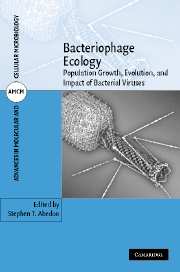Foreword by Bruce R. Levin
Published online by Cambridge University Press: 29 September 2009
Summary
More than forty years ago the then major honchos of molecular biology published a festschrift for Max Delbrück, lauding, in a self-congratulatory but often delightful and enthusiastic way, the central role bacteriophages played in the development of molecular biology (Cairns, J., G. Stent, and J. Watson. 1966. Phage and the Origins of Molecular Biology. Cold Spring Harbor, NY: Cold Spring Harbor Laboratory). The prominence of bacteriophages as model systems for studying molecular biology has since waned. However, even in these days where genetics is rarely done by allowing organisms to move genes by themselves (horror, mating between the unmarried?), bacteriophages maintain a major rep as tools for studies of the genetics and molecular biology of bacteria.
Bacteriophages, however, rarely come to mind when one thinks of ecology and evolutionary biology. Despite increasing numbers of meetings devoted entirely or partially to the ecology and evolution of bacteriophages, and a growing constituency of young investigators participating in these meetings, ecology and evolutionary biology has been and remains dominated not only by eukaryotic practitioners but also by eukaryotes as objects of study. Of some 195 000 articles listed on PubMed with the word “evolution” in some field, less than 0.7% list “bacteriophage” in another field, and of approximately 23 000 articles with “ecology,” less than 0.6% list “bacteriophage.”
- Type
- Chapter
- Information
- Bacteriophage EcologyPopulation Growth, Evolution, and Impact of Bacterial Viruses, pp. xiv - xviPublisher: Cambridge University PressPrint publication year: 2008



